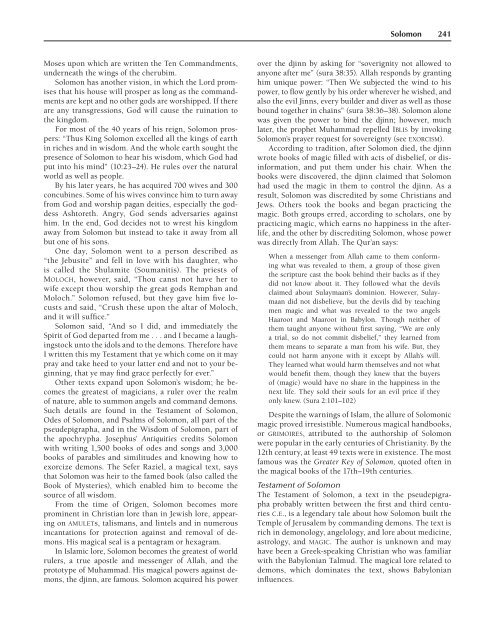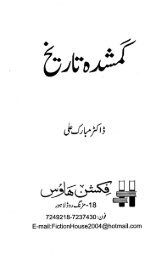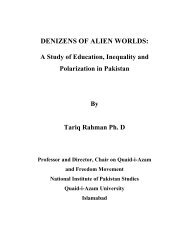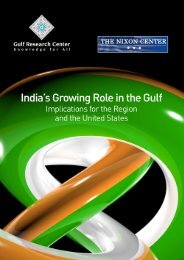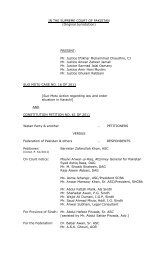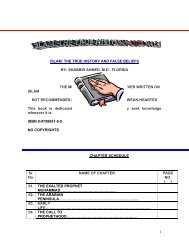The Encyclopedia Of Demons And Demonology
The Encyclopedia Of Demons And Demonology
The Encyclopedia Of Demons And Demonology
You also want an ePaper? Increase the reach of your titles
YUMPU automatically turns print PDFs into web optimized ePapers that Google loves.
Solomon 241<br />
Moses upon which are written the Ten Commandments,<br />
underneath the wings of the cherubim.<br />
Solomon has another vision, in which the Lord promises<br />
that his house will prosper as long as the commandments<br />
are kept and no other gods are worshipped. If there<br />
are any transgressions, God will cause the ruination to<br />
the kingdom.<br />
For most of the 40 years of his reign, Solomon prospers:<br />
“Thus King Solomon excelled all the kings of earth<br />
in riches and in wisdom. <strong>And</strong> the whole earth sought the<br />
presence of Solomon to hear his wisdom, which God had<br />
put into his mind” (10:23–24). He rules over the natural<br />
world as well as people.<br />
By his later years, he has acquired 700 wives and 300<br />
concubines. Some of his wives convince him to turn away<br />
from God and worship pagan deities, especially the goddess<br />
Ashtoreth. Angry, God sends adversaries against<br />
him. In the end, God decides not to wrest his kingdom<br />
away from Solomon but instead to take it away from all<br />
but one of his sons.<br />
One day, Solomon went to a person described as<br />
“the Jebusite” and fell in love with his daughter, who<br />
is called the Shulamite (Soumanitis). <strong>The</strong> priests of<br />
MOLOCH, however, said, “Thou canst not have her to<br />
wife except thou worship the great gods Remphan and<br />
Moloch.” Solomon refused, but they gave him five locusts<br />
and said, “Crush these upon the altar of Moloch,<br />
and it will suffice.”<br />
Solomon said, “<strong>And</strong> so I did, and immediately the<br />
Spirit of God departed from me . . . and I became a laughingstock<br />
unto the idols and to the demons. <strong>The</strong>refore have<br />
I written this my Testament that ye which come on it may<br />
pray and take heed to your latter end and not to your beginning,<br />
that ye may find grace perfectly for ever.”<br />
Other texts expand upon Solomon’s wisdom; he becomes<br />
the greatest of magicians, a ruler over the realm<br />
of nature, able to summon angels and command demons.<br />
Such details are found in the Testament of Solomon,<br />
Odes of Solomon, and Psalms of Solomon, all part of the<br />
pseudepigrapha, and in the Wisdom of Solomon, part of<br />
the apochrypha. Josephus’ Antiquities credits Solomon<br />
with writing 1,500 books of odes and songs and 3,000<br />
books of parables and similitudes and knowing how to<br />
exorcize demons. <strong>The</strong> Sefer Raziel, a magical text, says<br />
that Solomon was heir to the famed book (also called the<br />
Book of Mysteries), which enabled him to become the<br />
source of all wisdom.<br />
From the time of Origen, Solomon becomes more<br />
prominent in Christian lore than in Jewish lore, appearing<br />
on AMULETs, talismans, and lintels and in numerous<br />
incantations for protection against and removal of demons.<br />
His magical seal is a pentagram or hexagram.<br />
In Islamic lore, Solomon becomes the greatest of world<br />
rulers, a true apostle and messenger of Allah, and the<br />
prototype of Muhammad. His magical powers against demons,<br />
the djinn, are famous. Solomon acquired his power<br />
over the djinn by asking for “soverignity not allowed to<br />
anyone after me” (sura 38:35). Allah responds by granting<br />
him unique power: “<strong>The</strong>n We subjected the wind to his<br />
power, to flow gently by his order wherever he wished, and<br />
also the evil Jinns, every builder and diver as well as those<br />
bound together in chains” (sura 38:36–38). Solomon alone<br />
was given the power to bind the djinn; however, much<br />
later, the prophet Muhammad repelled IBLIS by invoking<br />
Solomon’s prayer request for sovereignty (see EXORCISM).<br />
According to tradition, after Solomon died, the djinn<br />
wrote books of magic filled with acts of disbelief, or disinformation,<br />
and put them under his chair. When the<br />
books were discovered, the djinn claimed that Solomon<br />
had used the magic in them to control the djinn. As a<br />
result, Solomon was discredited by some Christians and<br />
Jews. Others took the books and began practicing the<br />
magic. Both groups erred, according to scholars, one by<br />
practicing magic, which earns no happiness in the afterlife,<br />
and the other by discrediting Solomon, whose power<br />
was directly from Allah. <strong>The</strong> Qur’an says:<br />
When a messenger from Allah came to them conforming<br />
what was revealed to them, a group of those given<br />
the scripture cast the book behind their backs as if they<br />
did not know about it. <strong>The</strong>y followed what the devils<br />
claimed about Sulaymaan’s dominion. However, Sulaymaan<br />
did not disbelieve, but the devils did by teaching<br />
men magic and what was revealed to the two angels<br />
Haaroot and Maaroot in Babylon. Though neither of<br />
them taught anyone without first saying, “We are only<br />
a trial, so do not commit disbelief,” they learned from<br />
them means to separate a man from his wife. But, they<br />
could not harm anyone with it except by Allah’s will.<br />
<strong>The</strong>y learned what would harm themselves and not what<br />
would benefit them, though they knew that the buyers<br />
of (magic) would have no share in the happiness in the<br />
next life. <strong>The</strong>y sold their souls for an evil price if they<br />
only knew. (Sura 2:101–102)<br />
Despite the warnings of Islam, the allure of Solomonic<br />
magic proved irresistible. Numerous magical handbooks,<br />
or GRIMOIRES, attributed to the authorship of Solomon<br />
were popular in the early centuries of Christianity. By the<br />
12th century, at least 49 texts were in existence. <strong>The</strong> most<br />
famous was the Greater Key of Solomon, quoted often in<br />
the magical books of the 17th–19th centuries.<br />
Testament of Solomon<br />
<strong>The</strong> Testament of Solomon, a text in the pseudepigrapha<br />
probably written between the first and third centuries<br />
C.E., is a legendary tale about how Solomon built the<br />
Temple of Jerusalem by commanding demons. <strong>The</strong> text is<br />
rich in demonology, angelology, and lore about medicine,<br />
astrology, and MAGIC. <strong>The</strong> author is unknown and may<br />
have been a Greek-speaking Christian who was familiar<br />
with the Babylonian Talmud. <strong>The</strong> magical lore related to<br />
demons, which dominates the text, shows Babylonian<br />
influences.


